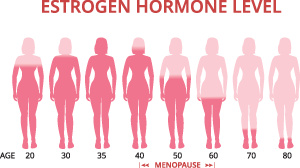The menopause is a fact of life for all women and the aggressive growth of unwanted facial hair is one of the side effects that many women dread.
The good news is that here, at the Derby-based Avance Clinic, we can offer expert laser hair removal services that can banish facial hair saving women time and embarrassment and boosting their confidence.
Our clients tell us that laser hair removal is less painful, and more effective, than waxing, IPL and electrolysis. Sessions are clean and quick and a course of treatments can permanently reduce hair growth. Many women dislike shaving facial hair daily with a razor and it often makes the hair feel more stubbly and coarse when it regrows. Depilatory creams are messy, time-consuming and can burn if left on too long.
Hormonal changes and facial hair in women

The menopause happens when a woman stops having periods and she can no longer conceive naturally. Some women may still be having periods, but their hormone levels are starting to change and this is called the perimenopause.
Some women can sail through the menopause and escape hot flushes, night sweats and mood swings – but many of us will see changes in facial hair at some stage as the levels of different hormones dip and rise. The hairs may be coarse or fine, fair or dark, spread out or focused in one area – or anything inbetween.
Oestrogen is the hormone that tells a woman’s ovaries to release an egg each month. As the level of this hormone decreases, to stop this process, a side effect is that your skin becomes more dry, wrinkles appear and your head hair can become thinner. In a cruel trick of nature, as the hair on our heads becomes sparser, unwanted hairs can begin sprouting like never before on our upper lip, chin, cheeks, throat and jaw line.
This is because as oestrogen levels fall, the small amount of testosterone (often called the male hormone), which women have in their bodies and dihydrotestosterone (DHT) can remain and result in the coarser, darker hairs many menopausal women see suddenly sprouting on their upper lip, chin, and jaw line.
How does laser hair removal treat menopausal facial hair?
Beneath our skin are hair follicles, and hormonal changes (at puberty as well as at menopause) can stimulate dormant hair follicles into growing hair in places where hair hasn’t grown before.
When hair is growing from a follicle, about one-sixteenth to an eighth of an inch of hair is hidden below the surface of the skin embedded in the hair follicle. The hair root is like a small bulb.
When hair is removed completely from the root, by waxing, threading or plucking, it can take between six weeks and three months for the follicle to completely reactivate and produce a new hair but you will see new hairs growing out of your skin every day because we all have MILLIONS of hair follicles and some are very close together.
So wouldn’t it be great to have a treatment that sweeps across a whole area and reduces or totally removes hair re-growth? That’s where laser hair removal comes in.
A concentrated beam of light from the specially-designed laser targets melanin, the pigment that gives hair its colour. This light goes straight to the root of the hair, permanently damaging it so that it won’t grow again or will be much paler, finer and less obvious.
Hair grows in cycles, which is why women approaching and experiencing the menopause will need a course of treatments. The laser works effectively on hair in the first stage of growth, called Anagen, so each treatment targets the hairs that have reached this stage.
What do women facing the menopause need to know about laser hair removal?
- Women approaching the menopause need to act quickly if they are considering laser hair removal because once hair turns white or grey, the lack of melanin in the hair means it can’t absorb the heat from a laser.
- The number of treatments each woman needs will vary because of her genes, her hormone levels and any medication they may be taking.
- Avance Clinic can offer every woman a free, confidential skin assessment and offer expert, tailored advice on how many sessions they will require to get their desired results.
- After a session of treatments, some women will need a very occasional top-up treatment to stay hair-free permanently. This is because hair can always start growing in follicles where it has not grown previously.
How do I find out more?
Contact us today at Avance Clinic to book a patch test and experience laser hair removal for yourself. We offer appointments from Tuesday to Saturday each week at our Derby clinic that is close to the M1, A38 and A50 making access easy for clients travelling from the East and West Midlands.
*We would always advise women who notice a very sudden or extreme change in facial and body hair growth or have any medical concerns, to consult their GP in case it is caused by a medical condition other than the menopause or perimenopause.

